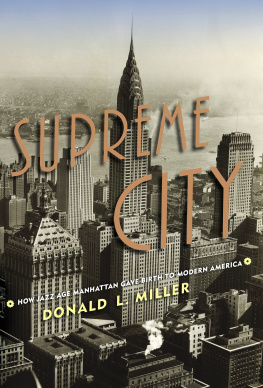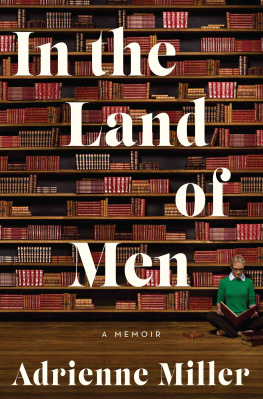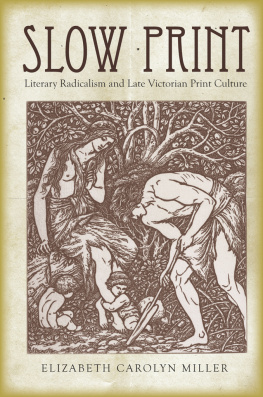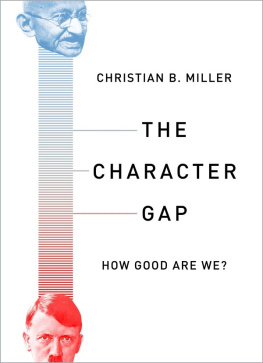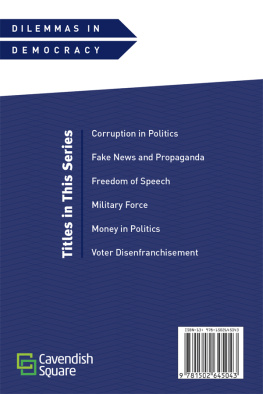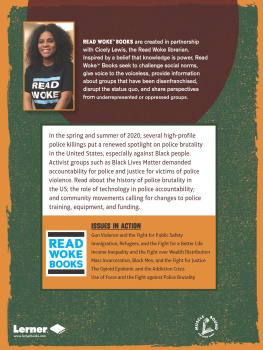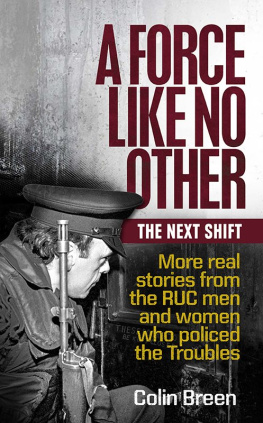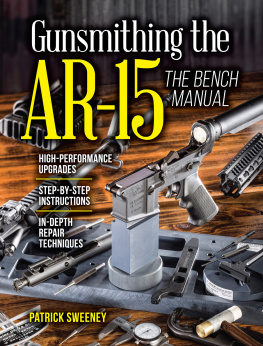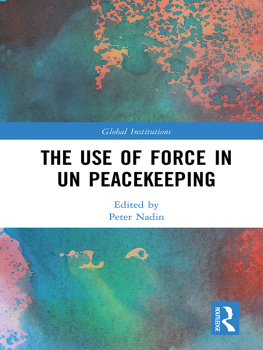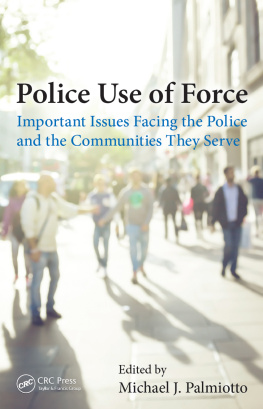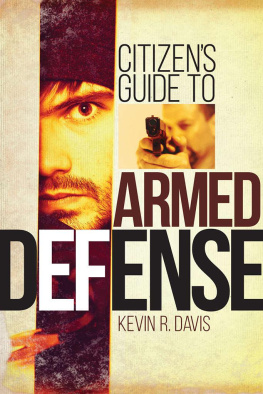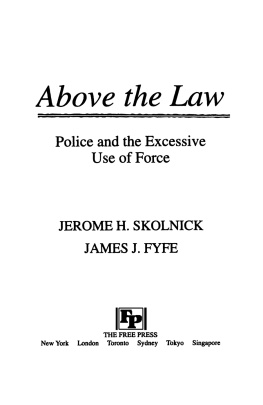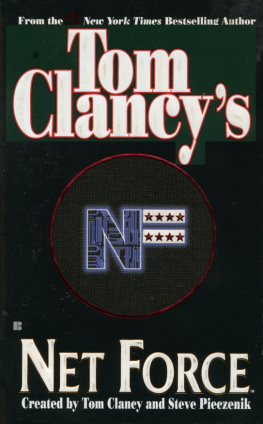FORCE DECISIONS
A CITIZENS GUIDE
Force Decisions
A Citizens Guide
Understanding How Police Determine Appropriate Use of Force
Rory Miller
YMAA Publication Center, Inc.
Wolfeboro NH USA
YMAA Publication Center, Inc.
PO Box 480
Wolfeboro, NH 03894
800-669-8892
Ebook edition ISBN: 978-1-59439-244-3
All rights reserved including the right of reproduction in whole or in part in any form.
Copyright 2012 by Rory Miller
Cover design by Axie Breen
Editing by Karen Barr Grossman
Photos provided by the author
Publishers Cataloging in Publication
Miller, Rory Kane.
Force decisions: a citizens guide: understanding how police determine appropriate use of force / Rory Miller. Wolfeboro, NH: YMAA Publication Center, c2012.
p.; cm.
ISBN: 978-1-59439-243-6 (pbk.); 978-1-59439-244-3 (ebk.)
Includes bibliographical references and index.
Summary: This book allows you to take a basic use of force police academy class, including training, checks and balances, experience, and review (from both the police and the suspect points of view).Publisher.
1. Police discretionUnited States. 2. Police trainingUnited States. 3. Arrest (Police methods)United States. 4. Self-defense (Law)United States. 5. Restraint of prisonersUnited States. 6. Justifiable homicideUnited States. 7. Violence (Law)United States. 8. Necessity (Law)United States. 9. Tort liability of policeUnited States. 10. Police misconductUnited States. 11. Policecommunity relationsUnited States. I. Title. II. Title: Understanding how police determine appropriate use of force.
HV7936.D54 M55 2012 2012933335
363.2/32dc23 1210
Warning: While self-defense is legal, fighting is illegal. If you dont know the difference youll go to jail because you arent defending yourself, you are fightingor worse. Readers are encouraged to be aware of all appropriate local and national laws relating to self-defense, reasonable force, and the use of weaponry, and act in accordance with all applicable laws at all times. Understand that while legal definitions and interpretations are generally uniform, there are smallbut very importantdifferences from state to state. To stay out of jail, you need to know these differences. Neither the authors nor the publisher assumes any responsibility for the use or misuse of information contained in this book.
Nothing in this document constitutes a legal opinion nor should any of its contents be treated as such. While the authors believe that everything herein is accurate, any questions regarding specific self-defense situations, legal liability, and/or interpretation of federal, state, or local laws should always be addressed by an attorney at law. This text relies on public news sources to gather information on various crimes and criminals described herein. While news reports of such incidences are generally accurate, they are on occasion incomplete or incorrect. Consequently, all suspects should be considered innocent until proven guilty in a court of law.
When it comes to martial arts, self-defense, and related topics, no text, no matter how well written, can substitute for professional, hands-on instruction. These materials should be used foracademicstudyonly.
Contents
I owe a debt of gratitude to a lot of people.
Loren Christensen, John Lupo, Jean Nichols, Sean Croft, Jim Sheeran, Lawdog MG, Eliel Hernandez, Frank Rodriguez (and the rest of the Pariah Dogs), Edward Raso, Jeff Gaynor, and George Mattson all graciously offered stories for this book. Be safe, all of you.
Most of them also helped with the manuscript, especially pointing out where I went off in my own private language. So did Rick Vogt, Melissa Williams, and Lawrence Kane. Good friends. Okay editors.
Donnla Nic Gearailt graciously offered to serve as a Subject Matter Expert on mental illness. Thank you.
That was about the book. The next is about me:
The officers who initially taught me Use of Force, especially Paul McRedmond (originator of the Three Golden Rules explained in ) and Ron Bishop, in my opinion, did an outstanding job. They had a truly encyclopedic knowledge of force policy and law, as well as deep experience with application.
Hundreds, if not thousands of officers and criminals over the years have also taught their particular lessons. We were not always friends, but I still thank them.
The indomitable Kami, wise and beautiful, who has held me when I bled or wanted to cry, has kept me sane through everything.
This ones for Mac.

This book is a gift, a peace offering. It is an attempt to communicate across a vast gulf in culture and experience, the gulf that exists between the Law Enforcement community and those whom they protect.
Each day, media outlets all over the country describe events where officers use force. Often, the reporters and the citizens question the need for force at all or whether the type and amount of force used was really necessary. Citizens worry that their protectorswith badges, guns, clubs and Tasersare caught up in the rush of power, or perhaps giving vent to anger or bigotry.
The officers are frustrated too. Specialists in dealing with a world that is sometimes very dark and very violent, they feel scrutinized. They feel as if their actions are constantly under a microscope, judged by a populace without any experience or training in a very specialized field.
In this book, I want to show you how officers think about force, not only how we are trained to think of it, but also how experience shapes our beliefs and attitudes.
If you are one of the people who believe that officers are thugs and question each and every use of force, I dont want to change you. Let me say that again: I dont want to change you. Sometimes my job requires me to use force on behalf of society, on your behalf. That force should be subject to your scrutiny.
What I do want, if you have objections, is to have those objections based on facts and not emotion. Most people will have a negative reaction to any violence, and some problems (from child-raising to the boardroom to politics and medicine and) simply dont have an answer that makes everyone comfortable.
You know what you saw or read. You know how that made you feel. The final data that you need to back up your reasonable objections are knowledge of the rulesto understand thoroughly the legal and policy limits as well as the tactical considerations that the professionals understand.
There are truths and perceptions that frame this gulf. First, the perceptions: We have all been taught that peace is an ideal, and that hurting people is wrong. We have also been taught, in an egalitarian society, that what is wrong for one is wrong for all. And what is wrong to do to someone is wrong to do to anyone.
The truth, however, is harsh. It is this: The only defense against evil, violent people is good people who are more skilled at violence.
HARD TRUTH #1
The only defense against evil, violent people is good people who are more skilled at violence.
Throughout history, civilized people faced with people willing to use violence to attain their goals have tried a number of strategies.
Appeasement has failed. The hope that Hitler would be satisfied with Poland and Czechoslovakia only gave him more time to prepare. Bribery has failed, and paying off terrorists to prevent terrorism has been no more effective than Danegeldmoney paid to Vikings to stop plundering. Reason and logic could not prevent the Khmer Rouge from killing every educated person in Cambodia. Simply being a good person couldnt dissuade the Inquisition.



